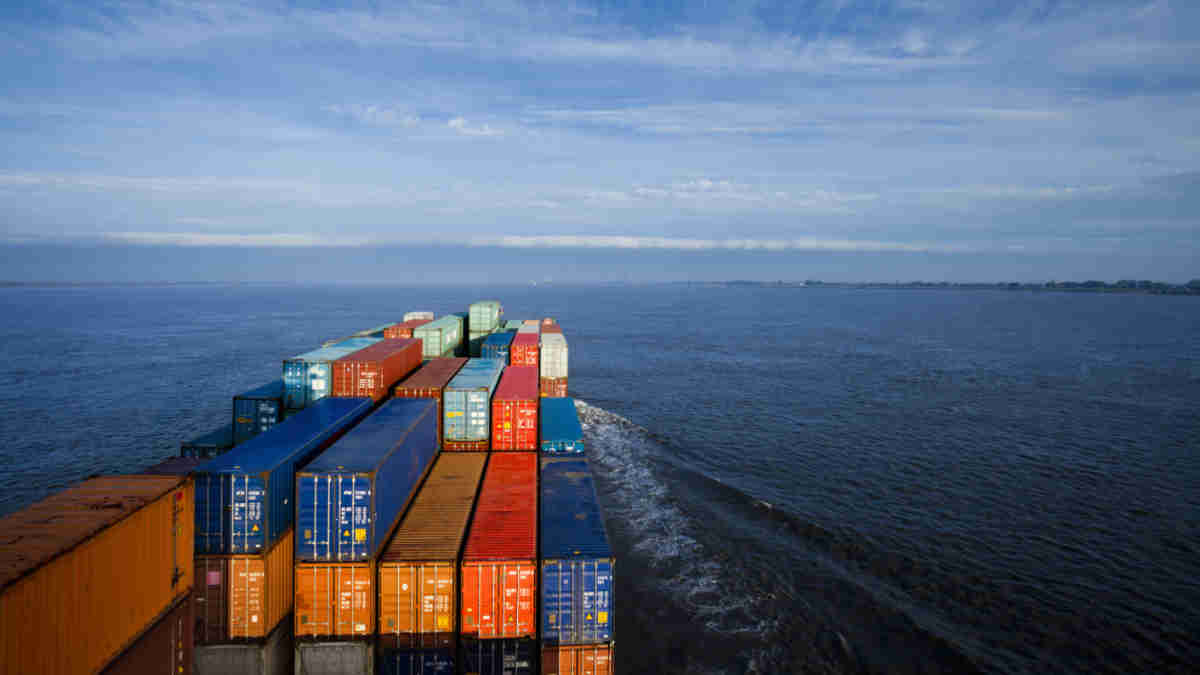The Ethical Investor: WiseTech’s eye-catching results turn focus on shipping sector’s green credentials

WiseTech’s eye-catching results have drawn attention to the sustainability of the shipping sector. Pic: Getty Images
- WiseTech rose 15pc after reporting a 28pc lift in revenue
- Despite geopolitical issues,high e-commerce demand is boosting logistics sector
- Shipping industry faces challenges but is making strides with green initiatives
WiseTech Global (ASX:WTC)’s results were arguably one of the major highlights in this week’s ASX earnings reporting season.
The $37-billion company’s stock price surged 15% on Wednesday to a new all-time high after reporting a 28% increase in full year revenue, reaching $1.04 billion. This result was just shy of the upper end of its guidance.
Bottom line NPAT also rose 15% to $283.5 million, easily surpassing estimates.
WiseTech’s world-leading CargoWise software is used by pretty much all major logistics providers.
The software simplifies complex logistics and supply chain operations into one system – managing trade, regulations, and e-commerce efficiently across different countries and currencies.
The company’s solid results have been driven by a strong rebound in the container shipping industry in 2024, despite ongoing challenges.
Conflicts in the Red Sea and Israel have disrupted key shipping routes, leading to increased journey times and costs.
Concurrently, congestion at Singapore’s port and rising shipping rates are causing delays and contributing to inflation.
However, the recent surge in e-commerce has sharply increased demand for container shipping. Businesses have also been raising container volumes by stockpiling inventory to protect against geopolitical uncertainties.
So how sustainable is shipping?
WiseTech’s eye-catching results have drawn attention to the sustainability of the shipping sector and raised questions about whether ethical investors should even consider it as an investment.
Over the last few years, sustainability has become crucial in every industry, including shipping.
Green shipping, which focuses on reducing the environmental impact of maritime operations, aims to cut carbon emissions, lower pollution, and protect ecosystems.
The shipping industry has adopted various strategies, such as using alternative fuels, improving vessel designs, and implementing advanced energy systems.
Despite these efforts, the sector still faces significant challenges, like greenhouse gas emissions and marine pollution.
However, progress is being made.
The International Maritime Organization (IMO) has set a goal to cut greenhouse gas emissions by 50% by 2050, which has led to significant improvements.
For example, new regulations and technologies, like the Energy Efficiency Design Index (EEDI) and low-sulphur fuels, have already reduced carbon intensity by 40% over the past decade.
On top of that, innovations such as hybrid and electric propulsion systems and the use of alternative fuels are helping to further reduce environmental impacts.
What issues top the ESG agenda in shipping?
But achieving sustainability in the maritime sector will require more investments and overcoming complex regulatory and operational hurdles.
Experts believe that the future success of the industry will largely depend on the actions it takes today regarding its ESG practices.
“Environmental concerns, public attention, and regulatory change have been the early drivers of many ESG efforts,” said Darryl Anderson at Mercy Ships Canada.
“Yet, a right fit needs to include the governance lens. I would also suggest that the social dimensions of ESG may need to become a higher priority.”
Marcela Crowley at NAMEPA added,”Creating the right culture and mindset for an ESG-fit maritime industry involves fostering a shared commitment to sustainability at all levels of the organisation.”
Alison Cusack, a lawyer at Cusack & Co believes that to shift away from the current mindset for ESG, we need to enact a two-prong approach.
“First, call out the inappropriate and negative behaviour of individuals, organisations, stakeholders. And second, have actual consequences for those behaviours.”
Vilde Lyngstad Hageselle at Grieg Green agrees, saying, “to engage younger generations, we must adopt forward-thinking practices.”
“Time is of importance, environmental regulations must be swiftly implemented for industry improvement.”
Logistics-related stocks on the ASX
Note this list is not comprehensive.
This $7 billion market-capped company specialises in logistics and infrastructure.
The company offers a range of services including freight handling, warehousing, and distribution across various industries.
Qube also operates port terminals and manages infrastructure assets, handling both containerised and bulk cargo.
Qube released its Sustainability Report this week, where it talked about, amongst many topics, the company’s strong commitment to safety, though it was marred by the tragic deaths of employees in separate incidents.
In response to those events, Qube said it has implemented new safety measures, including advanced monitoring systems.
Lindsay focuses on logistics and transportation services across Australia.
The company offers a range of transport solutions for various industries, handling everything from bulk freight to general cargo.
In addition to transportation, it provides logistics services like warehousing and distribution to help manage supply chains.
Lindsay’s services support clients in agriculture, mining, and manufacturing.
In FY24, Lindsay reported a record underlying EBITDA of $92.1 million despite weather disruptions and tough market conditions.
The recently-listed Bhagwan is an Australian marine services company providing a diverse range of marine solutions within Ports, Nearshore, Offshore and Subsea locations.
It provides services to industries including oil and gas, subsea, port, civil construction, renewables, and defence.
The company operates a fleet of over 95 vessels, which includes dive support vessels, tugboats, multi-cats, utility vessels, barges, crew transfer boats, and other specialised vessels.
Listed on 30 July at 63 cents a share, the company’s stock last traded at 66c.
Related Topics
UNLOCK INSIGHTS
Discover the untold stories of emerging ASX stocks.
Daily news and expert analysis, it's free to subscribe.
By proceeding, you confirm you understand that we handle personal information in accordance with our Privacy Policy.








